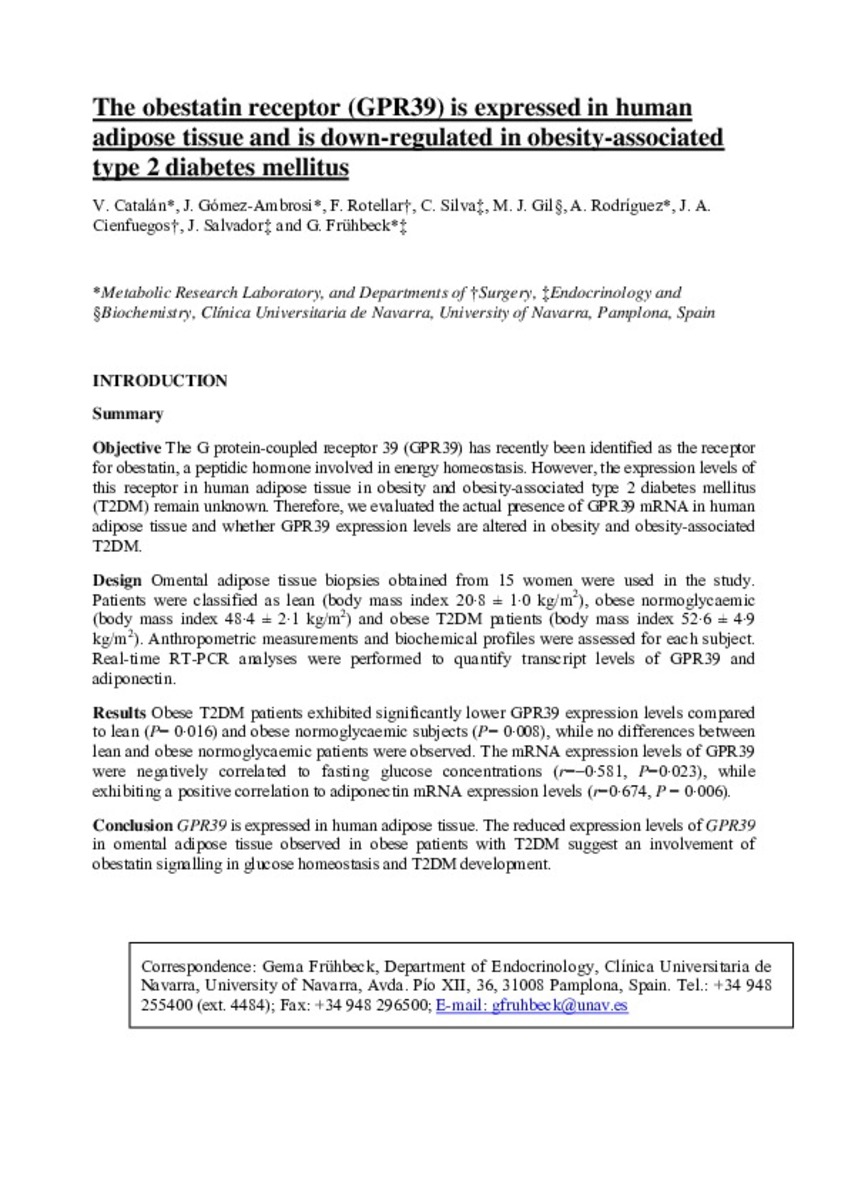Full metadata record
| DC Field | Value | Language |
|---|---|---|
| dc.creator | Catalan, V. (Victoria) | - |
| dc.creator | Gomez-Ambrosi, J. (Javier) | - |
| dc.creator | Rotellar, F. (Fernando) | - |
| dc.creator | Silva, C. (Camilo) | - |
| dc.creator | Gil, M.J. (María José) | - |
| dc.creator | Rodriguez, A. (Amaia) | - |
| dc.creator | Álvarez-Cienfuegos, J. (Javier) | - |
| dc.creator | Salvador, J. (Javier) | - |
| dc.creator | Frühbeck, G. (Gema) | - |
| dc.date.accessioned | 2012-10-24T08:04:38Z | - |
| dc.date.available | 2012-10-24T08:04:38Z | - |
| dc.date.issued | 2007 | - |
| dc.identifier.citation | Catalan V, Gomez-Ambrosi J, Rotellar F, Silva C, Gil MJ, Rodriguez A, et al. The obestatin receptor (GPR39) is expressed in human adipose tissue and is down-regulated in obesity-associated type 2 diabetes mellitus. Clin Endocrinol (Oxf) 2007 Apr;66(4):598-601. | es_ES |
| dc.identifier.issn | 0300-0664 | - |
| dc.identifier.uri | https://hdl.handle.net/10171/23476 | - |
| dc.description.abstract | The G protein-coupled receptor 39 (GPR39) has recently been identified as the receptor for obestatin, a peptidic hormone involved in energy homeostasis. However, the expression levels of this receptor in human adipose tissue in obesity and obesity-associated type 2 diabetes mellitus (T2DM) remain unknown. Therefore, we evaluated the actual presence of GPR39 mRNA in human adipose tissue and whether GPR39 expression levels are altered in obesity and obesity-associated T2DM. DESIGN: Omental adipose tissue biopsies obtained from 15 women were used in the study. Patients were classified as lean (body mass index 20.8 +/- 1.0 kg/m(2)), obese normoglycaemic (body mass index 48.4 +/- 2.1 kg/m(2)) and obese T2DM patients (body mass index 52.6 +/- 4.9 kg/m(2)). Anthropometric measurements and biochemical profiles were assessed for each subject. Real-time RT-PCR analyses were performed to quantify transcript levels of GPR39 and adiponectin. RESULTS: Obese T2DM patients exhibited significantly lower GPR39 expression levels compared to lean (P = 0.016) and obese normoglycaemic subjects (P = 0.008), while no differences between lean and obese normoglycaemic patients were observed. The mRNA expression levels of GPR39 were negatively correlated to fasting glucose concentrations (r = -0.581, P = 0.023), while exhibiting a positive correlation to adiponectin mRNA expression levels (r = 0.674, P = 0.006). CONCLUSION: GPR39 is expressed in human adipose tissue. The reduced expression levels of GPR39 in omental adipose tissue observed in obese patients with T2DM suggest an involvement of obestatin signalling in glucose homeostasis and T2DM development. | es_ES |
| dc.language.iso | eng | es_ES |
| dc.publisher | Society for Endocrinology | es_ES |
| dc.rights | info:eu-repo/semantics/openAccess | es_ES |
| dc.subject | Intra-Abdominal Fat/metabolism | es_ES |
| dc.subject | RNA, Messenger/analysis | es_ES |
| dc.subject | Receptors, G-Protein-Coupled/genetics | es_ES |
| dc.title | The obestatin receptor (GPR39) is expressed in human adipose tissue and is down-regulated in obesity-associated type 2 diabetes mellitus | es_ES |
| dc.type | info:eu-repo/semantics/article | es_ES |
| dc.relation.publisherversion | http://onlinelibrary.wiley.com/doi/10.1111/j.1365-2265.2007.02777.x/pdf | es_ES |
| dc.type.driver | info:eu-repo/semantics/article | es_ES |
Files in This Item:
Statistics and impact
Items in Dadun are protected by copyright, with all rights reserved, unless otherwise indicated.






